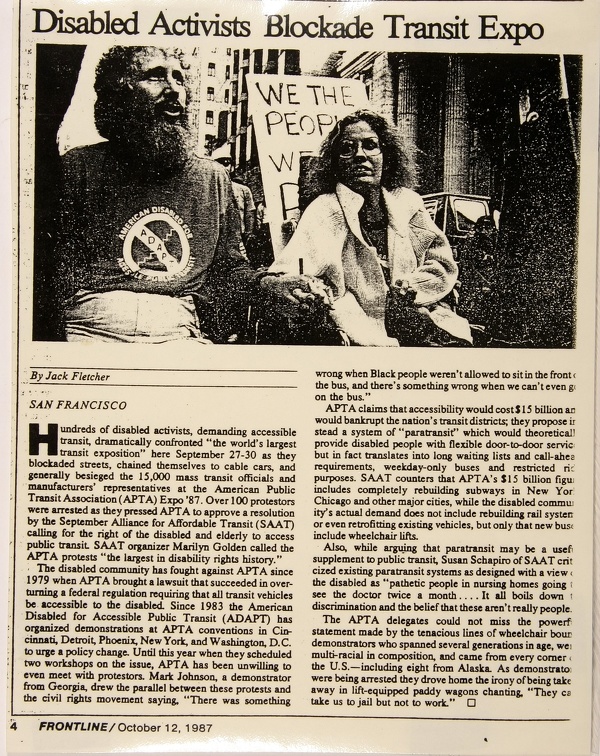- BiletstørrelsarFirkant
Miniatyrbilete
XXS - bitte lite
XS - ekstra lite
S - lite
M - middels stor
✔ L - stort - SpråkAfrikaans Argentina AzÉrbaycanca
á¥áá áá£áá Äesky Ãslenska
áá¶áá¶ááááá à¤à¥à¤à¤à¤£à¥ বাà¦à¦²à¦¾
தமிழ௠à²à²¨à³à²¨à²¡ ภาษาà¹à¸à¸¢
ä¸æ (ç¹é«) ä¸æ (é¦æ¸¯) Bahasa Indonesia
Brasil Brezhoneg CatalÃ
ç®ä½ä¸æ Dansk Deutsch
Dhivehi English English
English Español Esperanto
Estonian Finnish Français
Français Gaeilge Galego
Hrvatski Italiano Îλληνικά
íêµì´ LatvieÅ¡u Lëtzebuergesch
Lietuviu Magyar Malay
Nederlands Norwegian nynorsk Norwegian
Polski Português RomânÄ
Slovenšcina Slovensky Srpski
Svenska Türkçe Tiếng Viá»t
Ù¾Ø§Ø±Ø³Û æ¥æ¬èª ÐÑлгаÑÑки
ÐакедонÑки Ðонгол Ð ÑÑÑкий
СÑпÑки УкÑаÑнÑÑка ×¢×ר×ת
اÙعربÙØ© اÙعربÙØ©
Heim / Album / Stikkord Bob Kafka + paratransit
+ paratransit + arrests
+ arrests + civil rights movement
+ civil rights movement 1
1

 ADAPT (357)
ADAPT (357)
Disabled Activists Blockade Transit Expo By Jack Fletcher Frontline, October 12, 1987 PHOTO by Frontline: In a medium close up, man and a woman in wheelchairs (Bob Kafka and Diane Coleman), sit side by side in a downtown street and tall buildings in the background. Both wear the ADAPT T-shirt with the no-steps logo, Diane has on a white jacket. Bob is speaking and has his hand over Diane's, which is on her joy stick. Behind her head is a poster, partly blocked from view, that reads "We the People..." There is no caption. San Francisco Hundreds of disabled activists, demanding accessible transit, dramatically confronted “the world’s largest transit exposition” here September 27-30 as they blockaded streets, chained themselves to cable cars, and generally besieged the 15,000 mass transit officials and manufacturers’ representatives at the American Public Transit Association (APTA) Expo ’87. Over 100 protesters were arrested as they pressed APTA to approve a resolution by the September Alliance for Affordable Transit (SAAT) calling for the right of the disabled and elderly to access public transit. SAAT organizer Marilyn Golden called the APTA protests “the largest in disability rights history.” The disabled community has fought against APTA since 1979 when APTA brought a lawsuit that succeeded in overturning a federal regulation requiring that all transit vehicles be accessible to the disabled. Since 1983 the American Disabled for Accessible Public Transit (ADAPT) has organized demonstrations at APTA conventions in Cincinnati, Detroit, Phoenix, New York, and Washington, D. C. to urge a policy change. Until this year when they scheduled two workshops on the issue, APTA has been unwilling to even meet with protestors. Mark Johnson, a demonstrator from Georgia, drew the parallel between these protests and the civil rights movement saying, “There was something wrong when Black people weren’t allowed to sit in the front of the bus, and there’s something wrong when we can’t even go on the bus.” APTA claims that accessibility would cost $15 billion and would bankrupt the nation’s transit districts; they propose instead a system of “paratransit” which would theoretically provide disabled people with flexible door-to-door service but in fact translates into long waiting lists and call-ahead requirements, weekday-only buses and restricted ride purposes. SAAT counters that APTA’s $15 billion figure includes completely rebuilding subways in New York, Chicago and other cities, while the disabled community’s actual demand does not include rebuilding rail systems or even retrofitting existing vehicles, but only that new buses include wheelchair lifts. Also, while arguing that paratransit may be a useful supplement to public transit, Susan Schapiro of SAAT criticized existing paratransit systems as designed with a view of the disabled as “pathetic people in nursing homes going to see the doctor twice a month . . . . It all boils down to discrimination and the belief that these aren’t really people. The APTA delegates could not miss the powerful statement made by the tenacious lines of wheelchair bound demonstrators who spanned several generations in age, were multi-racial in composition, and came from every corner of the U.S. – including eight from Alaska. As demonstrators were being arrested they drove home the irony of being taken away in a lift-equipped paddy wagons chanting, “They can take us to jail but not to work.”